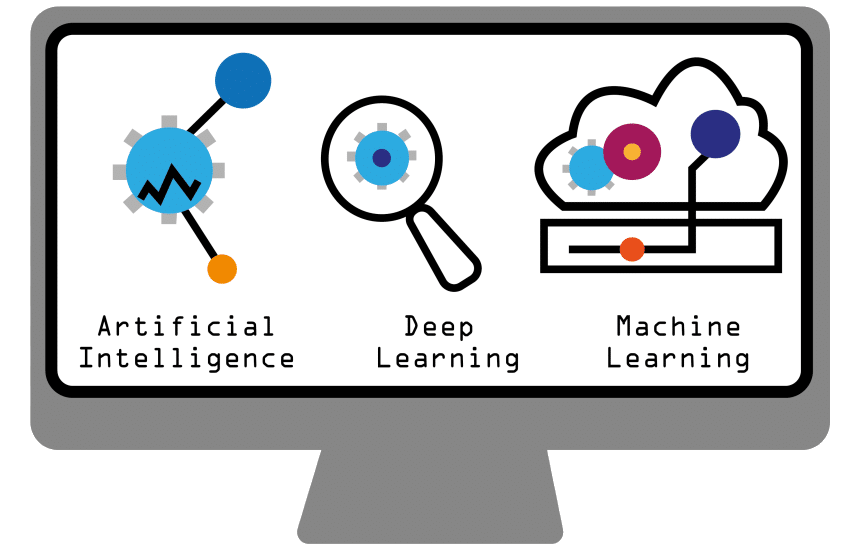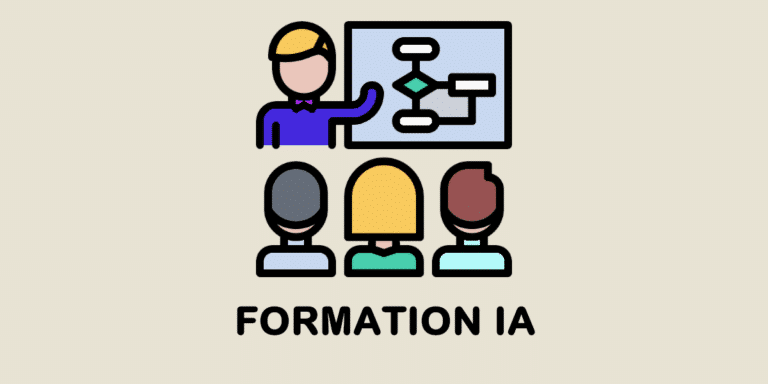How has AI evolved over time?
Since research began in the 1950s, the aim of Artificial Intelligence has been to create computer systems and machines capable of performing tasks normally requiring human intelligence.
It aims to develop algorithms and models that enable machines to learn, reason, recognize patterns, make decisions and solve problems autonomously.
After a long period of stagnation dubbed the “AI winter”, interest in this technology has seen a major resurgence in recent years, thanks to advances in the field of machine learning. In particular, the use of deep neural networks and deep learning have enabled the emergence of new use cases.
Machine learning enables computers to learn from data and improve with experience. This is what enables Amazon to recommend products, Gmail to suggest replies to messages, or Spotify to recommend new music.
Similarly, Natural Language Processing (NLP) is an AI technique that enables machines to understand and interact with human language. Customer service chatbots and voice assistants like Apple Siri are based on this technology.
With the recent emergence of Large Language Models such as OpenAI GPT or Google PaLM, new tools have emerged in 2022: generative AI, such as ChatGPT or Bard.
Artificial Intelligence is now capable of generating any type of written, visual or even audio content from a simple prompt entered by the user.
It’s a revolution, but it’s only the beginning. In the near future, AI will serve as the brain of humanoid robots capable of performing all kinds of manual tasks, like the Tesla Optimus.
In the longer term, research could lead to the birth of a “General Artificial Intelligence” that would be equivalent or even superior to human intelligence…
There’s no doubt that AI will change the world, automating many intellectual and manual tasks. In return, many jobs are likely to disappear, and many experts fear an unprecedented wave of unemployment.
However, this technology will also create millions of new jobs. As it evolves, new use cases will emerge, and the demand for experts capable of creating, managing or applying Artificial Intelligence will grow.
To take advantage of these new professional opportunities, training in AI is a highly relevant choice for your career. Here’s why.

Why train in Artificial Intelligence?
According to the World Economic Forum, the number of jobs replaced by AI will be far outstripped by the number created. By 2025, over 97 million new jobs could be created.
Better still, these would be roles “more suited to the new division of labor between humans, machines and algorithms”.
Therefore, learning to master Artificial Intelligence now can be a valuable sesame to future AI professions, or to incorporate the technology into your current profession.
The technology will continue to improve over the next few years, expanding into ever more diverse sectors and fields of application.
It is already used in many industries such as finance, medicine, security or automotive, and will soon be used in all fields.
In the face of strong demand, AI professionals can benefit from high remuneration. According to Talent.com, their median salary in France reaches €45,000 a year, and exceeds €70,000 for the most experienced.
AI professions and their salaries
The Artificial Intelligence Engineer or AI Engineer is a professional who uses AI and Machine Learning techniques to develop systems and applications to help businesses become more efficient.
This expert focuses on developing tools, systems and processes for applying AI to real-world problems. Algorithms are trained by data, which helps them learn and improve their performance.
In this way, an AI engineer enables an organization to reduce costs, increase productivity and profits, and make the best strategic decisions. According to Glassdoor, the average salary is €40,000 in France and $120,000 in the United States.
The ML Engineer researches, designs and builds the AI used for machine learning. He or she maintains and improves existing systems, and collaborates with the Data Scientists developing the models to build the AI systems.
On a daily basis, this professional conducts experiments and tests, performs statistical analyses and develops machine learning systems. Their salary exceeds €50,000 in France, according to Glassdoor, and $125,000 in the United States.
Another job linked to AI is that of Data Engineer. He or she is responsible for collecting, managing and converting raw data into actionable information for data scientists and other business analysts. The average salary is $115,592 in the USA and €45,000 in France, according to Glassdoor.
Similarly, the Data Scientist uses data to answer questions and solve business problems. They develop predictive models used to predict outcomes, and may use machine learning techniques. Their median salary is 48,000 euros in France and 126,000 dollars in the United States.
Software Engineers also have a role to play in Artificial Intelligence. They use computer code to create or improve all kinds of programs. Their average salary is €55,000 in France and $107,000 in the USA.
According to a McKinsey report, in 2022, 39% of companies recruited software engineers and 35% employed data engineers for AI-related positions.
Finally, Artificial Intelligence will very soon be incorporated into robots, so Robotics Engineers will also be part of the AI professions.
They design new products or assemble prototypes for testing, and observe their performance. This profession, which combines mechanical and electrical engineering with computer science, can earn a salary in excess of 42,000 euros a year, and $100,000 in the United States.
These are just a few examples of AI professions. In the future, many other professions will emerge, such as the Prompt Engineer responsible for designing prompts to achieve the best results with a tool like ChatGPT.
Whatever role you want to play in AI, training is essential to acquire the required expertise.

How do I take an Artificial Intelligence course?
To launch your career in Artificial Intelligence, you can obtain a professional certification to demonstrate your expertise to employers.
Some of today’s most widely recognized AI certifications include MIT: Artificial Intelligence: Implications for Business Strategy, USAII’s AI Engineer, Consultant and Scientist certifications, and ARTIBA’s Artificial Intelligence Engineer designation.
In order to obtain a diploma and assimilate all the essential skills needed to work in AI. Choose DataScientest. Our Machine Learning Engineer, Data Engineer and Data Scientist training courses will give you the expertise you need for your dream job.
You’ll learn about the fundamentals of Artificial Intelligence, machine learning, natural language processing (NLP), computer vision and the ethical issues involved in AI.










